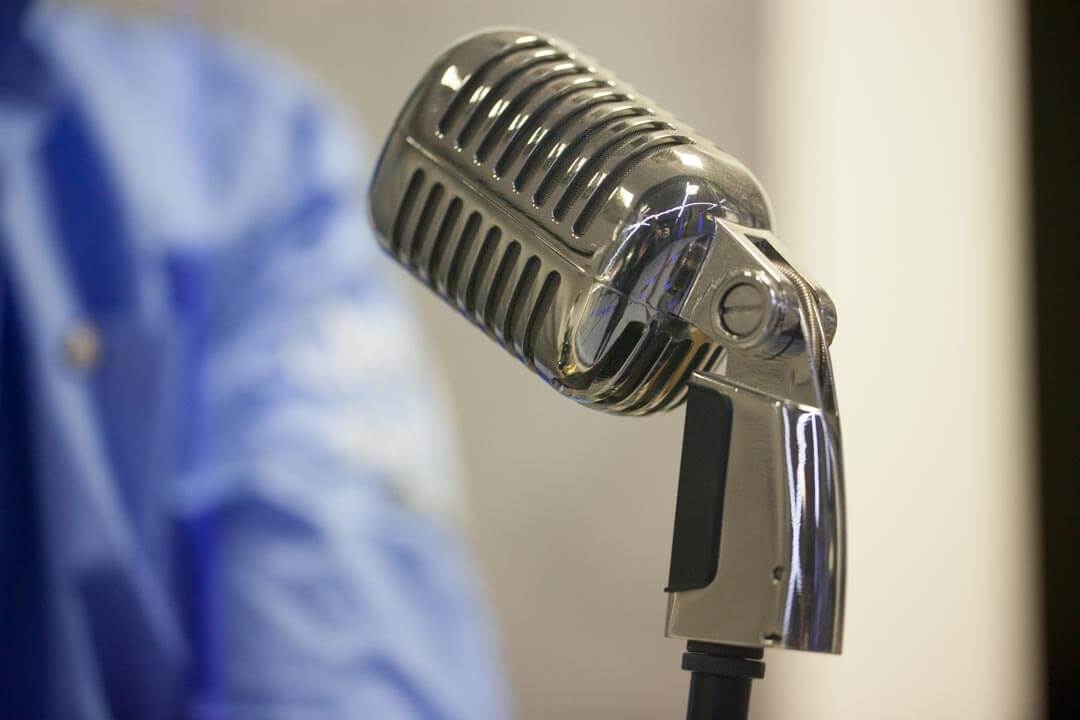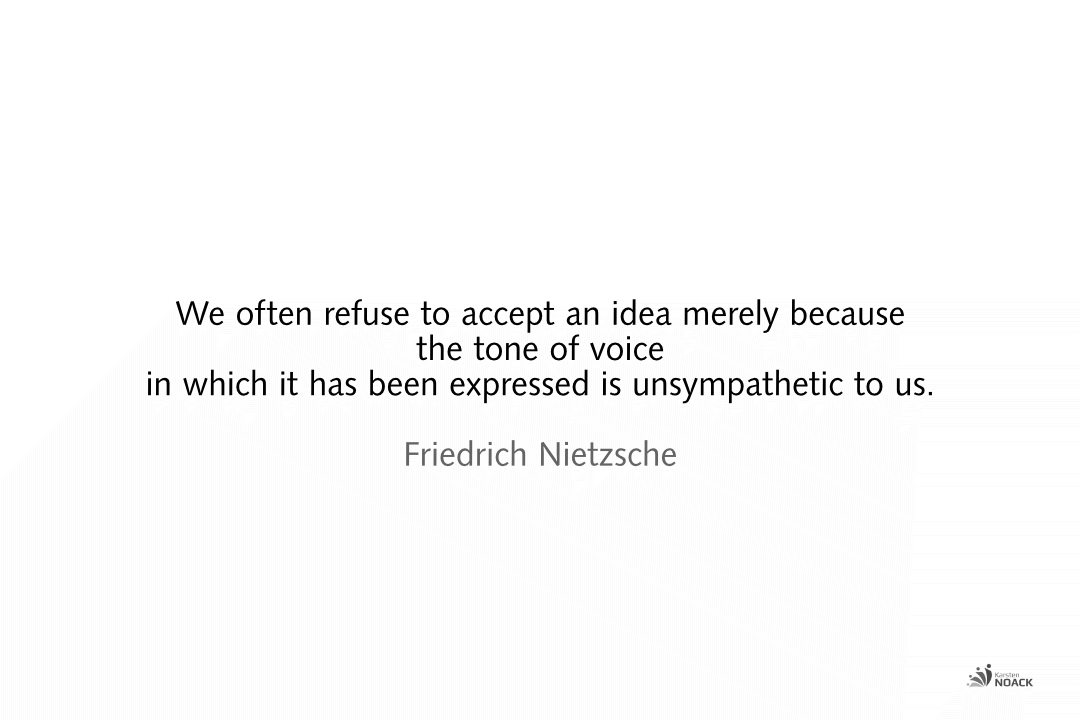Tips for a healthy voice and a sonorous performance
Public Speaking: Be careful with your voice and don't whisper
Protect your voice as a public speaker
Professional speakers must be particularly careful as their voices are their prerequisites for their tasks. That’s why you’ll find tips on how to protect your voice on these pages.
Overview
Each presentation is also a self-presentation.
Karsten Noack
Be careful with your voice
As a coach and speaker, I know how important a healthy voice is for some of us. Professional speakers need to be particularly careful because their voices are essential to their activities. Some people use their voices more often and under conditions that can cause additional stress. Uncontrolled screaming, shouting, and singing damage the voice, just like speaking for long periods in cold or noisy surroundings and during physical exertion.
That’s good to know: The voice can also be nurtured. There are many tips for public speakers.
Here are 14 tips for protecting your voice
1. Warm-up
Always warm up yourself and your voice before a speech. A cold start doesn’t do the voice any good. This can include relaxation techniques and gentle exercise. Your voice coach will show you suitable techniques specifically for activating your voice.
2. Use your natural voice
Avoid forcing your voice to a lower or unnatural pitch.
3. Regenerate yourself and your voice
Permanent speech strains the vocal cords. This often happens unnoticed in the beginning, but at some point, the body defends itself with hoarseness.
Rest your voice as much as possible between performances and avoid tension and stress. If the voice is attacked due to an infection, it is advisable to rest your voice temporarily and drink a lot of fluids, for example, ginger tea. So the best strategy to get back to your voice quickly is still to just “shut up”.
4. Train your voice
Participate in voice training and learn voice techniques that can protect and improve your voice.
5. Coughing instead of clearing your throat
If you have a hoarse voice, you usually clear your throat. In this way, our voice becomes clear again, but we strain the sensitive mucous membranes of the vocal folds. It is better and just as effective to cough briefly.
6. Don’t smoke
Smoking is taboo for good vocal hygiene.
7. Avoid an unhealthy environment
Avoid unhealthy, smoky rooms, bars, and places where the environment can adversely affect speech quality.
8. Beware of alcohol
Drink alcohol moderately, if at all.
9. Be careful with coffee
Coffee, black and green tea should only be consumed in moderation, as these drinks dry out the mucous membranes.
10. Drink water
Keep yourself and your voice moist by drinking plenty of non-carbonated water.
11. Healthy lifestyle
Practice a healthy lifestyle that includes cardio training and good nutrition.
12. Whispering can be hazardous to your voice
The fastest way to lose our voice is to scream or shout. But there are also many less obvious ways to burden your voice, and public speakers need to know them. One example is whispering. To protect your voice, you may think that whispering is softer, gentler, and less stressful for your vocal cords. But the truth is that whispering can be dangerous for your voice.
Whispering does affect your voice more than normal speech. When you whisper, you send an enormous amount of extra air to the vocal cords, making them dry and irritated. This is even worse than screaming and shouting. When whispering, the vocal folds are tightened so that they are closed at the front and open at the back. This is an unnatural way of using the voice. When you do this for a long time, you will find it difficult to speak normally again afterward, because it impedes the vocal cords in their function.
If you need to speak, don’t whisper. People who care about their voices should avoid whispering and just talk quietly.
13. Trust is good, control is better
In case of doubt, you would rather go to a medical specialist, such as a medical doctor who knows what to do.
14. Many more tips
And there are many more ways in which to protect your voice.
Preparation of important speeches and presentations
Those who do not speak are not heard, and even those who speak up are not always successful. There are a few more steps that need to be mastered.
Do you want to convince with your message and also as a personality? Then I will help you to prepare your speeches and presentations. You determine the scope. At least, I recommend a test run with professional feedback for you and your message. Then you will know how you and your content are perceived, what you should do, and what you should leave out, where there is potential. Why do you want to get such helpful feedback so late after your real performance? Then it is too late for adjustments. Benefit from the advantage. My definition of luck: Preparation meets opportunity.
You can best estimate for yourself where the effort is worthwhile concerning the expected benefit. Here you will find the fees for my support (communication, psychology, language, structure, voice, body language, storytelling, rhetorical means, media such as PowerPoint and Co., etc.)
You are not in Berlin right now? Then choose meetings with me via telephone or video support. Whereby, there are quite good reasons for a trip to Berlin.
By the way, many people suffer from such intense stage fright in front of an audience, and therefore their performance lags behind their possibilities. Too bad, because with my help performance in a good condition is possible. Just in case...
A good start: Professional feedback with suggestions for improvement
How persuasive are you and your messages in speeches and presentations? How good are you at the 111+ most important presentation skills? I have been analyzing speeches since 1998. After evaluating 14,375 speeches and presentations, and numerous mistakes of my own, most of which I only discovered after a delay, I can tell you exactly what works with which audience. Let me give you the feedback that will help you get ahead. You will receive essential feedback and recommendations, as well as the impulses you need to persuade your audience in concrete situations.
Are you interested? If so, here is how to get helpful feedback with recommendations for improving your speeches and presentations.
Just ask me personally
Please post any questions that may be of interest to other readers in the comments. Looking for professional help?
If you are interested in coaching, training or consulting, if you have organizational questions, or if you want to make an appointment, you can reach me best via this contact form (you can choose whether you want to enter your personal data) or via e-mail (mail@karstennoack.com). The privacy policy can be found here.
Transparency is important. That is why you will find answers to frequently asked questions already here, for example about me (profile), the services, the fees and getting to know me. If you like what you see, I look forward to working with you.
Remarks:
In the address bar of your browser, the URL should begin with "https://www.karstennoack.com/...". This indicates a secure connection (SSL). Whether you enter your real name is up to you.
Tongue twisters from A to Z as training for voice, articulation and concentration
Tongue breakers are used to train dedicated speakers for speaking, articulation, and concentration.

This article is a short excerpt from the more comprehensive course materials my clients receive in a group or individual training or coaching.
Published: March 21, 2002
Author: Karsten Noack
Revision: August 20th, 2023
Translation: ./.
German version:
K:
H:
T: RR
#675

0 Comments